Unit 11课文翻译a
学术英语(社科)Unit1-8 Text A译文
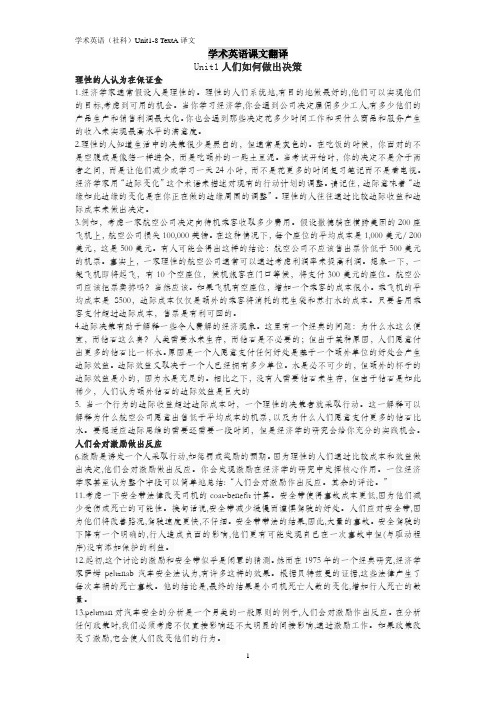
学术英语课文翻译Unit1人们如何做出决策理性的人认为在保证金1.经济学家通常假设人是理性的。
理性的人们系统地,有目的地做最好的,他们可以实现他们的目标,考虑到可用的机会。
当你学习经济学,你会遇到公司决定雇佣多少工人,有多少他们的产品生产和销售利润最大化。
你也会遇到那些决定花多少时间工作和买什么商品和服务产生的收入来实现最高水平的满意度。
2.理性的人知道生活中的决策很少是黑白的,但通常是灰色的。
在吃饭的时候,你面对的不是空腹或是像猪一样进食,而是吃额外的一匙土豆泥。
当考试开始时,你的决定不是介于两者之间,而是让他们减少或学习一天24小时,而不是花更多的时间复习笔记而不是看电视。
经济学家用“边际变化”这个术语来描述对现有的行动计划的调整。
请记住,边际意味着“边缘如此边缘的变化是在你正在做的边缘周围的调整”。
理性的人往往通过比较边际收益和边际成本来做出决定。
3.例如,考虑一家航空公司决定向待机乘客收取多少费用。
假设撒德躺在横跨美国的200座飞机上,航空公司损失100,000英镑。
在这种情况下,每个座位的平均成本是1,000美元/ 200美元,这是500美元。
有人可能会得出这样的结论:航空公司不应该售出票价低于500美元的机票。
事实上,一家理性的航空公司通常可以通过考虑利润率来提高利润。
想象一下,一架飞机即将起飞,有10个空座位,候机旅客在门口等候,将支付300美元的座位。
航空公司应该把票卖掉吗?当然应该。
如果飞机有空座位,增加一个乘客的成本很小。
乘飞机的平均成本是S500,边际成本仅仅是额外的乘客将消耗的花生袋和苏打水的成本。
只要备用乘客支付超过边际成本,售票是有利可图的。
4.边际决策有助于解释一些令人费解的经济现象。
这里有一个经典的问题:为什么水这么便宜,而钻石这么贵?人类需要水来生存,而钻石是不必要的;但出于某种原因,人们愿意付出更多的钻石比一杯水。
原因是一个人愿意支付任何好处是基于一个额外单位的好处会产生边际效益。
全新版大学英语综合教程第二册1~6单元a课文翻译及原文 整理版
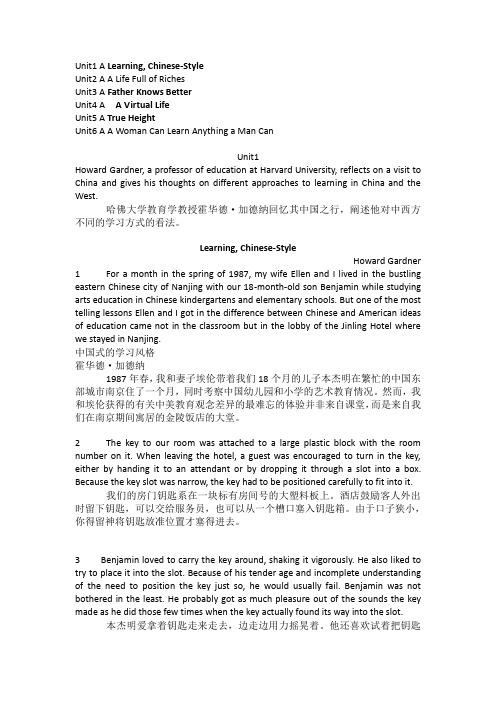
Unit1 A Learning, Chinese-StyleUnit2 A A Life Full of RichesUnit3 A Father Knows BetterUnit4 A A Virtual LifeUnit5 A True HeightUnit6 A A Woman Can Learn Anything a Man CanUnit1Howard Gardner, a professor of education at Harvard University, reflects on a visit to China and gives his thoughts on different approaches to learning in China and the West.哈佛大学教育学教授霍华德·加德纳回忆其中国之行,阐述他对中西方不同的学习方式的看法。
Learning, Chinese-StyleHoward Gardner 1 For a month in the spring of 1987, my wife Ellen and I lived in the bustling eastern Chinese city of Nanjing with our 18-month-old son Benjamin while studying arts education in Chinese kindergartens and elementary schools. But one of the most telling lessons Ellen and I got in the difference between Chinese and American ideas of education came not in the classroom but in the lobby of the Jinling Hotel where we stayed in Nanjing.中国式的学习风格霍华德·加德纳1987年春,我和妻子埃伦带着我们18个月的儿子本杰明在繁忙的中国东部城市南京住了一个月,同时考察中国幼儿园和小学的艺术教育情况。
人教版九年级英语 Unit11--Unit14 课文翻译

Unit 11 Sad movies made me cry.Section A 2d南希:嗨!伯特,我想我把爱丽丝给逼的受不了,而且我还不确信该怎么做。
波特:发生什么事了?南希:你知道朱莉是爱丽斯最好的朋友,对吧?波特:嗯嗯。
南希:唔,我对朱莉了解得越多,越感到我们有许多相同之处。
所以我们最近呆在一起的时间更多了。
波特:但那有什么问题吗?南希:嗯…..这让爱丽斯不开心,因为她认为朱莉现在成为了跟我比跟她更要好的朋友。
波特:我知道了。
嗯….每一次你和朱莉在一起做事的时候,你何不邀请爱丽斯一起加入呢?这样她就不会觉得被冷落。
南希:奥,好主意!那还能使我们的友谊更加牢固。
Section A 3a快乐者的衬衫!(1)很久以前,在一个富饶而又美丽的国家里,住着一位不开心的国王。
他睡不好觉,也没有食欲。
他总是面色苍白,还常常无端哭泣。
这让往后和他的子民都很担心。
一天,一位医生被招来给国王检查身体。
但他发现国王的身体并没有任何的问题。
“他的病都在心里。
药物和休息对他都无效。
他需要的是一个快乐的人所穿的衬衫,那会使他快乐起来。
”首相被叫到宫殿,但当人们把国王的情况向他解释后,他却说:“尽管我有很多权利,但他并没有让我快乐。
我总是担心会失去权力。
有许多人都在试图取代我的位置。
”接着,国王的银行家来到宫殿,“唉,我恐怕也不快乐呢,”他说:“我有很多财富,但是我总是担心丢失钱财。
每天都有人想窃取我的金钱。
”接下来,宫殿的歌手来到国王的房间,但是他却这样说:“的确我很有名,而且每个人都喜欢我的歌。
但是我并不快乐,因为我总是担心被人跟踪,我没有自由。
”最后,国王的大将军被派出去,要他在三天之内找到一个快乐的人。
Section B,2b胜利之队彼得的眼睛盯着地面,当他一个人独自走在回家路上的时候,觉得双肩沉重。
今天是他人生中最糟糕的日子。
他脑海里总停不住想一个小时以前学校足球场上发生的事。
他怎么错过了进球呢?他让全队都失望了。
八年级下册英语unit1-unit10课文翻译

Unit1 What's the matter?2dA丽萨,你好吗?B我头疼,并且脖子不能动。
我该怎么办?我应该量体温吗?A不,听起来不像是你发烧。
周末你做什么了?B我整个周末都在玩电脑游戏。
A那很可能就是原因,你需要离开电脑休息几次。
B是的,我想我是一个姿势做的太久没有移动。
A我认为你应该躺下休息。
如果明天你的头和脖子还痛的话,就去看医生。
B好的,谢谢,曼迪.3a 公交车司机和乘客救了一位老人昨天上午九点,26路公交车正行驶在中华路上,这时司机看到一位老人躺在路边.在他旁边一位妇女在喊救命。
公交车司机,24岁的王平没有多想就停下来公交车.他下了车,问那个妇女发生了什么事。
她说那个人有心脏病,应该去医院。
王先生知道他必须快点行动。
他告诉乘客他必须送老人去医院。
他希望大部分或全部乘客下车去等下一辆公交车。
但出乎他的意料,他们都同意和他一起去.一些乘客帮助王先生把那个老人移到公交车上。
多亏了王先生和乘客们。
医生及时挽救了老人的生命.“许多人因为不想有麻烦而不想帮助别人,这真令人难受”,一位乘客说。
“但是这位司机没有考虑自己。
他只考虑挽救一条生命。
"2b 他失去了手臂但还在爬山阿伦是一个对爬山感兴趣的美国人.作为一名登山者,阿伦习惯于冒险。
这是关于做危险运动的令人兴奋的事情之一。
有许多次,阿伦因为(意外)事故几乎失去生命。
在2003年4月26日,在犹他州登山时他发现自己在非常危险的处境。
在那天,当阿伦独自登山时,他的手臂被压在落在他身上的一块360千克的岩石下。
因为他的手臂不能自由活动,他在那儿待了五天,希望有人会发现他。
但当他的水喝完了,他知道他将不得不采取措施来挽救的生命了。
他不愿意那天就死去。
因此他用刀子切除了他的一半右臂。
然后,他用左臂给自己打上绷带以至于他不会失去太多的血。
这之后,他爬下山区寻求帮助。
在他失去手臂后,他写了一本名为《生死抉择》(又译作《生死两难》)的书。
他的意思是“处于一个你似乎无法拜托的困境之中”。
第三版新视野大学英语第二册课文翻译

Unit 1An impressive English lesson1 If I am the only parent who still corrects his child's English, then perhaps my son is right. To him, I am a tedious oddity: a father he is obliged to listen to and a man absorbed in the rules of grammar, which my son seems allergic to.2 I think I got serious about this only recently when I ran into one of my former students, fresh from an excursion to Europe. "How was it?" I asked, full of earnest anticipation.3 She nodded three or four times, searched the heavens for the right words, and then exclaimed, "It was, like, whoa!"4 And that was it. The civilization of Greece and the glory of Roman architecture were captured ina condensed non-statement. My student's "whoa!" was exceeded only by my head-shaking distress.5 There are many different stories about the downturn in the proper use of English. Surely students should be able to distinguish between their/there/they're or the distinctive difference between complimentary and complementary. They unfairly bear the bulk of the criticism for these knowledge deficits because there is a sense that they should know better.6 Students are not dumb, but they are being misled everywhere they look and listen. For example, signs in grocery stores point them to the stationary, even though the actual stationery items — pads, albums and notebooks —are not nailed down. Friends and loved ones often proclaim they've just ate when, in fact, they've just eaten. Therefore, it doesn't make any sense to criticize our students.7 Blame for the scandal of this language deficit should be thrust upon our schools, which should be setting high standards of English language proficiency. Instead, they only teach a little grammar and even less advanced vocabulary. Moreover, the younger teachers themselves evidently have little knowledge of these vital structures of language because they also went without exposure to them. Schools fail to adequately teach the essential framework of language, accurate grammar and proper vocabulary, while they should take the responsibility of pushing the young onto the path of competent communication.8 Since grammar is boring to most of the young students, I think that it must be handled delicately, step by step. The chance came when one day I was driving with my son. As we set out on our trip, he noticed a bird in jerky flight and said, "It's flying so unsteady." I carefully asked, "My son, how is the bird flying?" "What's wrong? Did I say anything incorrectly?" He got lost. "Great! You said incorrectly instead of incorrect. We use adverbs to describe verbs. Therefore, it's flying so unsteadily but not so unsteady."9 Curious about my correction, he asked me what an adverb was. Slowly, I said, "It's a word that tells you something about a verb." It led to his asking me what a verb was. I explained, "Verbs are action words; for example, Dad drives the truck. Drive is the verb because it's the thing Dad is doing."10 He became attracted to the idea of action words, so we listed a few more: fly, swim, dive, run. Then, out of his own curiosity, he asked me if other words had names for their use and functions. This led to a discussion of nouns, adjectives, and articles. Within the span of a 10-minute drive, he had learned from scratch to the major parts of speech in a sentence. It was painless learning and great fun!11 Perhaps, language should be looked upon as a road map and a valuable possession: often study the road map (check grammar) and tune up the car engine (adjust vocabulary). Learning grammar and a good vocabulary is just like driving with a road map in a well-conditioned car.12 The road map provides the framework and guidance you need for your trip, but it won't tell you exactly what trees or flowers you will see, what kind of people you will encounter, or what types of feelings you will be experiencing on your journey. Here, the vocabulary makes the journey's true colors come alive! A good vocabulary enables you to enjoy whatever you see as you drive along. Equipped with grammar and a good vocabulary, you have flexibility and excellent control. While the road map guides your journey to your destination, an excellent vehicle helps you to fully enjoy all of the sights, sounds and experiences along the way.13 Effective, precise, and beneficial communication depends upon grammar and a good vocabulary, the two essential assets for students, but they are not being taught in schools.14 Just this morning, my son and I were eating breakfast when I attempted to add milk to my tea. "Dad," he said, "If I were you, I wouldn't do that. It's sour."15 "Oh my!" I said, swelling with pride toward my son, "That's a grammatically perfect sentence. You used were instead of was."16 "I know, I know," he said with a long agreeable sigh. "It's the subjunctive mood."17 I was, like, whoa!Translation一堂难忘的英语课1 如果我是唯一一个还在纠正小孩英语的家长,那么我儿子也许是对的。
新视野大学英语第三版第四册课文翻译

unit 1 TextALove and logic: The story of a fallacy爱情与逻辑: 谬误的故事1 I had my first date with Polly afterI made the trade with my roommate Rob.That year every guy on campus had a leather jacket, and Rob couldn't stand the idea of being the only football player who didn't, so he made a pact that he'd give me his girl in exchange for my jacket.He wasn't the brightest guy.Polly wasn't too shrewd, either.在我和室友罗伯的交易成功之后, 我和波莉有了第一次约会。
那一年校园里每个人都有件皮夹克, 而罗伯是校足球队员中唯一一个没有皮夹克的, 他一想到这个就受不了, 于是他和我达成了一项协议, 用他的女友换取我的夹克。
他可不则聪明, 而他的女友波莉也不太精明。
2 But she was pretty, well-off, didn't dye her hair strange colors or wear too much makeup.She had the right background to be the girlfriend of a dogged, brilliant lawyer.If I could show the elite law firms I applied to that I had a radiant, well-spoken counterpart by my side, I just might edge past the competition.但她漂亮而且富有, 也没有把头发染成奇怪的颜色或是化很浓的妆。
人教版九年级英语1-14单元课文翻译
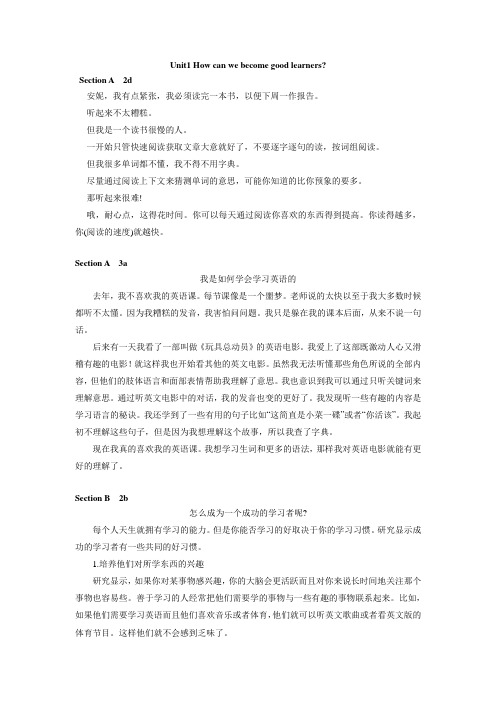
Unit1 How can we become good learners?Section A 2d----安妮,我有点紧张,我必须读完一本书,以便下周一作报告。
----听起来不太糟糕。
----但我是一个读书很慢的人。
----一开始只管快速阅读获取文章大意就好了,不要逐字逐句的读,按词组阅读。
----但我很多单词都不懂,我不得不用字典。
----尽量通过阅读上下文来猜测单词的意思,可能你知道的比你预象的要多。
----那听起来很难!----哦,耐心点,这得花时间。
你可以每天通过阅读你喜欢的东西得到提高。
你读得越多,你(阅读的速度)就越快。
Section A 3a我是如何学会学习英语的去年,我不喜欢我的英语课。
每节课像是一个噩梦。
老师说的太快以至于我大多数时候都听不太懂。
因为我糟糕的发音,我害怕问问题。
我只是躲在我的课本后面,从来不说一句话。
后来有一天我看了一部叫做《玩具总动员》的英语电影。
我爱上了这部既激动人心又滑稽有趣的电影!就这样我也开始看其他的英文电影。
虽然我无法听懂那些角色所说的全部内容,但他们的肢体语言和面部表情帮助我理解了意思。
我也意识到我可以通过只听关键词来理解意思。
通过听英文电影中的对话,我的发音也变的更好了。
我发现听一些有趣的内容是学习语言的秘诀。
我还学到了一些有用的句子比如“这简直是小菜一碟”或者“你活该”。
我起初不理解这些句子,但是因为我想理解这个故事,所以我查了字典。
现在我真的喜欢我的英语课。
我想学习生词和更多的语法,那样我对英语电影就能有更好的理解了。
Section B 2b怎么成为一个成功的学习者呢?每个人天生就拥有学习的能力。
但是你能否学习的好取决于你的学习习惯。
研究显示成功的学习者有一些共同的好习惯。
1.培养他们对所学东西的兴趣研究显示,如果你对某事物感兴趣,你的大脑会更活跃而且对你来说长时间地关注那个事物也容易些。
善于学习的人经常把他们需要学的事物与一些有趣的事物联系起来。
新编英语教程unit1,2,3,4,5,8,9,10,11 课文翻译
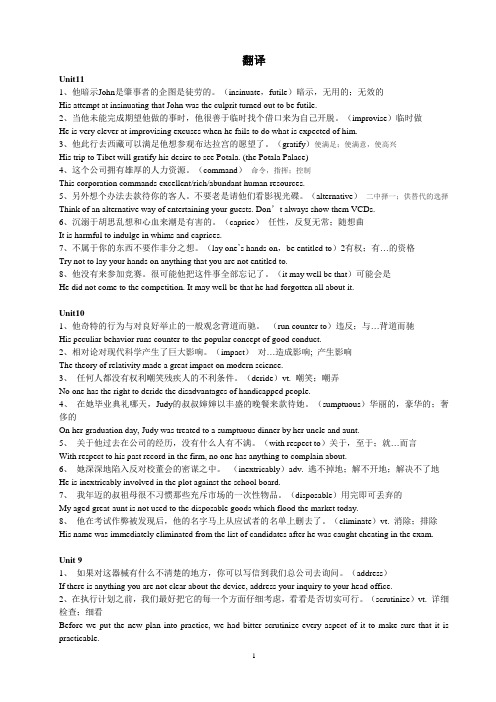
翻译Unit111、他暗示John是肇事者的企图是徒劳的。
(insinuate,futile)暗示,无用的;无效的His attempt at insinuating that John was the culprit turned out to be futile.2、当他未能完成期望他做的事时,他很善于临时找个借口来为自己开脱。
(improvise)临时做He is very clever at improvising excuses when he fails to do what is expected of him.3、他此行去西藏可以满足他想参观布达拉宫的愿望了。
(gratify)使满足;使满意,使高兴His trip to Tibet will gratify his desire to see Potala. (the Potala Palace)4、这个公司拥有雄厚的人力资源。
(command)命令,指挥;控制This corporation commands excellent/rich/abundant human resources.5、另外想个办法去款待你的客人。
不要老是请他们看影视光碟。
(alternative)二中择一;供替代的选择Think of an alternative way of entertaining your guests. Don’t always show them VCDs.6、沉溺于胡思乱想和心血来潮是有害的。
(caprice)任性,反复无常;随想曲It is harmful to indulge in whims and caprices.7、不属于你的东西不要作非分之想。
(lay one’s hands on,be entitled to)2有权;有…的资格Try not to lay your hands on anything that you are not entitled to.8、他没有来参加竞赛。
人教版新目标八年级英语上册课文翻译A
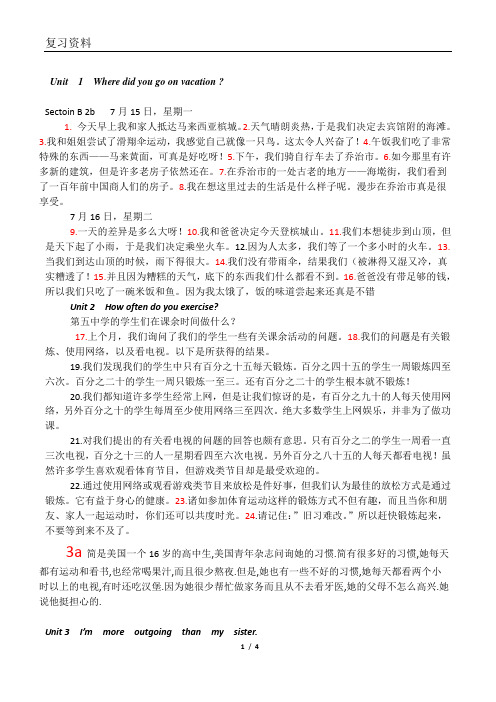
Unit 1 Where did you go on vacation ?Sectoin B 2b 7月15日,星期一1.今天早上我和家人抵达马来西亚槟城。
2.天气晴朗炎热,于是我们决定去宾馆附的海滩。
3.我和姐姐尝试了滑翔伞运动,我感觉自己就像一只鸟。
这太令人兴奋了!4.午饭我们吃了非常特殊的东西——马来黄面,可真是好吃呀!5.下午,我们骑自行车去了乔治市。
6.如今那里有许多新的建筑,但是许多老房子依然还在。
7.在乔治市的一处古老的地方——海墘街,我们看到了一百年前中国商人们的房子。
8.我在想这里过去的生活是什么样子呢。
漫步在乔治市真是很享受。
7月16日,星期二9.一天的差异是多么大呀!10.我和爸爸决定今天登槟城山。
11.我们本想徒步到山顶,但是天下起了小雨,于是我们决定乘坐火车。
12.因为人太多,我们等了一个多小时的火车。
13.当我们到达山顶的时候,雨下得很大。
14.我们没有带雨伞,结果我们(被淋得又湿又冷,真实糟透了!15.并且因为糟糕的天气,底下的东西我们什么都看不到。
16.爸爸没有带足够的钱,所以我们只吃了一碗米饭和鱼。
因为我太饿了,饭的味道尝起来还真是不错Unit 2 How often do you exercise?第五中学的学生们在课余时间做什么?17.上个月,我们询问了我们的学生一些有关课余活动的问题。
18.我们的问题是有关锻炼、使用网络,以及看电视。
以下是所获得的结果。
19.我们发现我们的学生中只有百分之十五每天锻炼。
百分之四十五的学生一周锻炼四至六次。
百分之二十的学生一周只锻炼一至三。
还有百分之二十的学生根本就不锻炼!20.我们都知道许多学生经常上网,但是让我们惊讶的是,有百分之九十的人每天使用网络,另外百分之十的学生每周至少使用网络三至四次。
绝大多数学生上网娱乐,并非为了做功课。
21.对我们提出的有关看电视的问题的回答也颇有意思。
只有百分之二的学生一周看一直三次电视,百分之十三的人一星期看四至六次电视。
人教版新目标七年级英语上 册初一英语上册课文翻译【全 册】
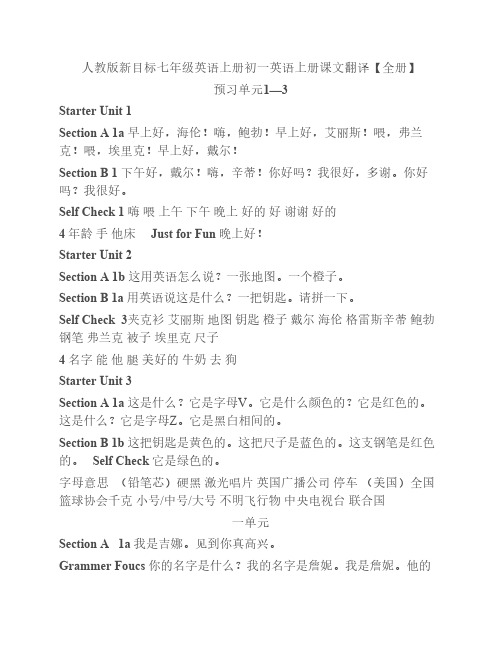
人教版新目标七年级英语上册初一英语上册课文翻译【全册】预习单元1—3Starter Unit 1Section A 1a早上好,海伦!嗨,鲍勃!早上好,艾丽斯!喂,弗兰克!喂,埃里克!早上好,戴尔!Section B 1下午好,戴尔!嗨,辛蒂!你好吗?我很好,多谢。
你好吗?我很好。
Self Check 1嗨喂上午下午晚上好的好谢谢好的4年龄手他床Just for Fun晚上好!Starter Unit 2Section A 1b这用英语怎么说?一张地图。
一个橙子。
Section B 1a用英语说这是什么?一把钥匙。
请拼一下。
Self Check 3夹克衫艾丽斯地图钥匙橙子戴尔海伦格雷斯辛蒂鲍勃钢笔弗兰克被子埃里克尺子4名字能他腿美好的牛奶去狗Starter Unit 3Section A 1a这是什么?它是字母V。
它是什么颜色的?它是红色的。
这是什么?它是字母Z。
它是黑白相间的。
Section B 1b这把钥匙是黄色的。
这把尺子是蓝色的。
这支钢笔是红色的。
Self Check它是绿色的。
字母意思(铅笔芯)硬黑激光唱片英国广播公司停车(美国)全国篮球协会千克小号/中号/大号不明飞行物中央电视台联合国一单元Section A 1a我是吉娜。
见到你真高兴。
Grammer Foucs你的名字是什么?我的名字是詹妮。
我是詹妮。
他的名字是什么?他的名字是托尼。
她的名字是什么?她的名字是吉娜。
Section B 1c你的电话号码是什么,李欣?是281-6926。
3b她的电话号码是什么?她的姓氏是什么?她的名字是什么?Self Check 1我她是身份证什么我的喂你的他的她的名姓电话号码Just for Fun你的名是什么?ZIG。
你的姓是什么?ZAG。
二单元Section A1a那是你的双肩背包吗?不,不是。
它是他的双肩背包。
这是你的铅笔吗?是的,它是。
它是我的铅笔。
这是你的尺子吗?不,不是。
它是她的尺子。
铅笔钢笔书橡皮擦尺子铅笔盒书包卷笔刀词典2b请原谅,索尼亚。
人教版pep五年级下英语书全本翻译
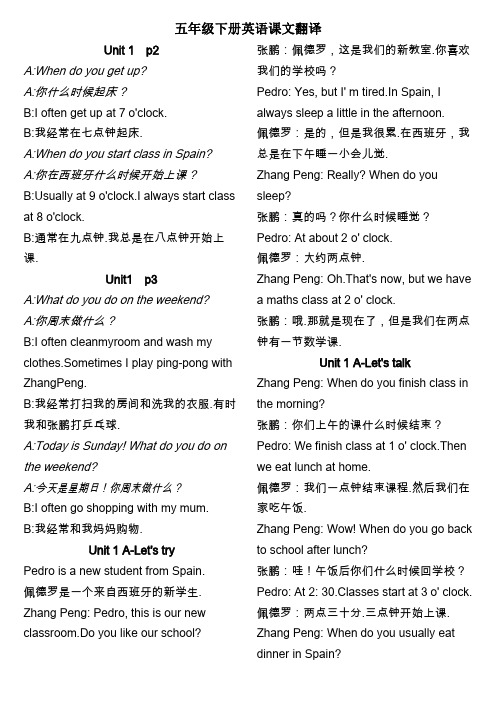
Unit1p2A:When do you get up?A:你什么时候起床?B:I often get up at7o'clock.B:我经常在七点钟起床.A:When do you start class in Spain? A:你在西班牙什么时候开始上课?B:Usually at9o'clock.I always start class at8o'clock.B:通常在九点钟.我总是在八点钟开始上课.Unit1p3A:What do you do on the weekend?A:你周末做什么?B:I often cleanmyroom and wash my clothes.Sometimes I play ping-pong with ZhangPeng.B:我经常打扫我的房间和洗我的衣服.有时我和张鹏打乒乓球.A:Today is Sunday!What do you do on the weekend?A:今天是星期日!你周末做什么?B:I often go shopping with my mum.B:我经常和我妈妈购物.Unit1A-Let's tryPedro is a new student from Spain.佩德罗是一个来自西班牙的新学生. Zhang Peng:Pedro,this is our new classroom.Do you like our school?张鹏:佩德罗,这是我们的新教室.你喜欢我们的学校吗?Pedro:Yes,but I'm tired.In Spain,I always sleep a little in the afternoon.佩德罗:是的,但是我很累.在西班牙,我总是在下午睡一小会儿觉.Zhang Peng:Really?When do you sleep?张鹏:真的吗?你什么时候睡觉?Pedro:At about2o'clock.佩德罗:大约两点钟.Zhang Peng:Oh.That's now,but we have a maths class at2o'clock.张鹏:哦.那就是现在了,但是我们在两点钟有一节数学课.Unit1A-Let's talkZhang Peng:When do you finish class in the morning?张鹏:你们上午的课什么时候结束?Pedro:We finish class at1o'clock.Then we eat lunch at home.佩德罗:我们一点钟结束课程.然后我们在家吃午饭.Zhang Peng:Wow!When do you go back to school after lunch?张鹏:哇!午饭后你们什么时候回学校?Pedro:At2:30.Classes start at3o'clock.佩德罗:两点三十分.三点钟开始上课. Zhang Peng:When do you usually eat dinner in Spain?张鹏:你在西班牙通常什么时候吃晚饭?Pedro:Usually at9:30or10o'clock.佩德罗:通常在九点三十分或者十点钟. Zhang Peng:Wow!That's too late!张鹏:哇!那太晚了!Unit1B-Let's trySarah:Hello,Mrs Green.Good to see you!萨拉:你好,格林夫人.见到你很高兴!Shopkeeper:Hi,Sarah.Welcome to our shop again.店主:嗨,萨拉.欢迎再次来到我们的商店. Sarah:I want to buy some vegetables.萨拉:我想要买一些蔬菜. Shopkeeper:Here are some fresh carrots.You don't often shop here on Saturdays.店主:这是一些新鲜的胡萝卜.你星期六不经常在这里购物.Sarah:No,not often.萨拉:是的,不经常.Unit1B-Let's talk Shopkeeper:Why are you shopping today?店主:今天你为什么购物?Sarah:My mum worked last night.So I'm shopping today.萨拉:我妈妈昨晚工作了,所以今天我购物.Shopkeeper:Good girl!So what do you do on the weekend?店主:好女孩儿!那么你在周末做什么?Sarah:I often watch TV and playping-pong with my father.萨拉:我经常看电视,也常和我爸爸一起打乒乓球.Shopkeeper:That sounds like a lot of fun.店主:那听起来好像很有趣.Sarah:Yes,but I'm also hard-working.I usually wash my clothes.Sometimes I cook dinner.萨拉:是的,但是我也很勤劳.我通常洗衣服.有时我做晚饭.Shopkeeper:You're so busy!You need a robot to help you!店主:你真忙!你需要一个机器人来帮助你!Unit1B-Read and writeRobin's play罗宾的戏剧Robin is in a play.He is Robinson Crusoe.Here is a letter from him.罗宾在演戏.他扮演鲁滨逊?克鲁索.这是一封来自他的信.My name is Robinson.I live on an island.I always get up early every day.I wash my face,and then I eat breakfast.Sometimes I clean my cave,too.我的名字是鲁滨逊.我住在一个岛上.我每天总是很早起床.我洗脸,然后吃早饭.有时我也打扫我的山洞.I often go swimming in the water.In the afternoon,I play sports with my friend.His name is Friday.我经常去水里游泳.下午,我和我的朋友进行体育运动.他的名字是星期五.Friday is good at sports.He often wins.星期五擅长体育运动.他经常获胜.Unit1B-Let's checkAmy:Mike,let's go swimming on the weekend.埃米:迈克,让我们周末去游泳吧. Mike:I'm sorry.I can't.迈克:我很抱歉.我不能去.Amy:Why not?埃米:为什么不呢?Mike:I always clean my room and do my homework on the weekend.迈克:我总是在周末打扫我的房间并且做家庭作业.Amy:OK.埃米:好吧.Mike:Have fun!迈克:玩得开心点!Unit2P12A:Which season do you like best?A:你最喜欢哪个季节?B:Autumn.B:秋天.A:Why?A:为什么?B:Because the colours are pretty!B:因为颜色很漂亮!A:Which season do you like best?A:你最喜欢哪个季节?B:Winter!I can sleep all day.How about you?B:冬天!我能整天睡觉.你呢?A:I like spring best.There are beautiful flowers every where.A:我最喜欢春天,到处都有美丽的花.Unit2P13A:Look at my picture,Miss White.I like summer best because of Children's Day. A:看我的图片,怀特老师.我最喜欢夏天,因为(有)儿童节.B:What do you often do in summer?B:你在夏天经常做什么?A:I often go swimming.A:我经常去游泳.Unit2A-Let's tryMike:It's a windy day.迈克:今天是多风的一天.Chen Jie:Yes.It's cold,too.陈杰:是的.还很冷.Mike:What's your favourite season,Chen Jie?迈克:你最喜欢的季节是什么,陈杰?Chen Jie:Autumn.It is beautiful here in Beijing.陈杰:秋天.在北京这里秋天很漂亮.Unit2A-Let's talkMr Jones:Do you like the music, children?琼斯老师:你们喜欢这个音乐吗,孩子们?Mike:Yes.It's very beautiful.What is it?迈克:喜欢.它很美妙.它是什么?Mr Jones:The Four Seasons.Today we'll draw the seasons.Which season do you like best,Mike?琼斯老师:《四季》.今天我们将画季节.你最喜欢哪个季节,迈克?Mike:Winter.I like snow.迈克:冬天.我喜欢雪.Mr Jones:I like snow,too.Which season do you like best,Wu Yifan?琼斯老师:我也喜欢雪.你最喜欢哪个季节,吴一凡?Wu Yifan:Spring.It's pretty.吴一凡:春天.它很美丽.Mr Jones:Yes,it is.琼斯老师:是的,它很美丽.Unit2B-Let's tryZhang Peng:Look at my picture,John.张鹏:看我的画,约翰.John:It's pretty.So you like spring best?约翰:它很漂亮.那么你最喜欢春天?Zhang Peng:Yes.Spring isbeautiful.There are lots of flowers.The trees are green.张鹏:是的.春天很漂亮.有许多花朵.树是绿色的.Unit2B-Let's talkAmy:Hello,Miss White.Look at my picture.埃米:你好,怀特老师.看我的画.Miss White:Good job!I like the trees.The colours are very pretty!怀特老师:做得好!我喜欢这些树.颜色很漂亮!Amy:Yes.I like autumn best.The weather is good and the colours are beautiful! Which season do you like best,Miss White?埃米:是的.我最喜欢秋天.天气很好,颜色很漂亮!你最喜欢哪个季节,怀特老师?Miss White:Summer.怀特老师:夏天.Amy:Why?埃米:为什么?Miss White:Because I like summer vacation!怀特老师:因为我喜欢暑假!Unit2B-Read and writeRobin likes them all!罗宾喜欢它们全部!Look at the green trees and pink flowers.看绿色的树和粉色的花.I like spring because there are beautiful flowers everywhere.我喜欢春天,因为到处都有美丽的花. The weather is hot,hot,hot!天气炎热、炎热、炎热!I like summer,but I can't swim.我喜欢夏天,但是我不会游泳.What lovely colours!The leaves fall and fall and fall.I love fall!多么美丽的颜色啊!叶子落啊落啊落.我爱秋天!Wow!I want to paint a picture,too!哇!我还想要画一幅画!There is lots of snow.It is white everywhere.有很多雪.到处都是白色的.I like winter because I can play in the snow.我喜欢冬天,因为我能在雪里玩.Unit2B-Let's checkBoy:When is your birthday?男孩:你的生日是什么时候?Girl:It's in summer.女孩:它在夏天.Boy:Do you like summer?男孩:你喜欢夏天吗?Girl:No,I don't.It's too hot.女孩:不,我不喜欢.夏天太热了.Boy:Which season do you like best?男孩:你最喜欢哪个季节?Girl:Autumn.The colours are beautiful.I can pick fresh apples.女孩:秋天.颜色很漂亮.我可以摘新鲜的苹果.Unit3P22、P23A:When is the summer vacation?A:暑假是什么时候?B:It's in July and August.B:在七月和八月.A:When is Tree Planting Day?A:植树节是什么时候?B:It'sin March.B:在三月.A:When is Dragon Boat Festival?A:端午节是什么时候?B:It's usually in June.My mum will make zongzi then.I hope you can come and share some with us.B:通常在六月.那时我妈妈将包粽子.我希望你能来和我们一起分享一些(粽子). A:That's very kind of you.A:你真是太好了.A:When is the school trip this year?A:今年的学校郊游是什么时候?B:It's in May.B:在五月.A:Is the singing contest in May,too? A:歌唱比赛也在五月吗?B:Yes.B:是的.A:Hooray for May!A:五月万岁!1January(Jan.)New Year's Day一月元旦2February(Feb.)winter vacation二月寒假3March(Mar.)Tree Planting Day三月植树节4April(Apr.)Easter\sports meet四月复活节\运动会5May(无缩写)MayDay\Mother's Day 五月劳动节\母亲节6June(Jun.)Children’s Day\Father's Day 六月儿童节\父亲节7July(Jul.)summer vacation七月暑假8August(Aug.)summer vacation八月暑假9September(Sept.)Teachers’Day\Mid-Autumn Day九月教师节\中秋节10October(Oct.)China's National Day十月中国国庆节11November(Nov.)American Thanksgiving Day十一月美国感恩节12December(Dec.)Christmas十二月圣诞节Unit3A-Let's tryMike:What's that,Zhang Peng?迈克:那是什么,张鹏?Zhang Peng:It's an invitation for my mum and dad.张鹏:它是一张给我妈妈和爸爸的请柬. Mike:What for?迈克:为了什么?Zhang Peng:For the sports meet next week.I will run.张鹏:为了下星期的运动会.我将要跑步. Mike:I see.Good luck!迈克:我知道了.祝你好运!Zhang Peng:Thank you!张鹏:谢谢你!Unit3A-Let’s talkMike:We have a few fun things in spring. After the sports meet,we have an Easter party.迈克:在春天我们有一些有趣的事情,运动会之后,我们举办一场复活节聚会。
2014-2015学年九年级英语人教版新教材课文第十一单元译文

Unit 11The Shirt of a Happy Man( Part 1)(一个快乐男人的衬衫)(第一部分)衬衫快乐的男人A long time ago, in a rich and beautiful country, there lived an unhappy king, He slept很久很久以前在富饶美丽的国家居住着不快乐的国王贪睡badly and didn’t feel like eating. His face was always pale as chalk. He often cried for no 不喜欢吃脸总是苍白的像粉笔经常哭没有reason. This made the queen and his people worried.原因使得女王人担心One day , a doctor was一天检查国王发现没有毛病body. “ It’s all in his mind. Neither medicine nor rest can help him. What he needs is the shirt 身体所有的都在他的思想中既不药也不休息能帮助他…所需要衬衫of a happy person to wear. That’ll make him happy.”他快乐’s皇宫当解释国王的situation to him, he said, “ Although I have a lot of power, it doesn’t make me happy. I’m情况给他说尽管有很多权力不能使我快乐always worried about losing my power. Many people are trying to take my position.”总是担心失去权力很多人试图取代位置Then, the king’s banker came to the palace. “ Oh, I’m afraid I’m not happy either,” he然后国王的银行家来到皇宫恐怕不快乐也said. “ I have a lot of wealth, but I’m always worried about losing my money. Someone tries to说有很多财富总是担心失去钱有人试图steal my money every day.”偷钱每天Next, the palace singer came to the king’s room. But this was what he said : “ It’s true接下来皇宫歌手来到国王的房间这是…所说真的that I’m famous and everyone loves my songs. But I’m not happy because I’m always worried出名的每个人喜欢歌不快乐因为总是担心about being followed by others. I cannot be free!”被跟被其他人自由Finally, the king’s top general was told to go out and find a happy man in three days’ time.最后国王的高级将领出去找快乐的男人在三天的时间The Winning Team(获胜的团队)Peter kept his eyes on the ground. He felt like there was a heavy weight on his shoulders彼得保持眼睛地面觉得有很重的重量肩膀as he walked home alone. It was the worst day of his life. His mind would not stop thinking当走路回家独自最糟糕的生活头脑将不会停止思考about what happened only just an hour ago on the school soccer field. How could he have…所发生仅仅一小时前在学校足球场如何能missed scoring that goal? He had let his whole team down. His stupid mistake made him angry.错过得分目标使整个队失望愚蠢错误使他生气His team had lost the game because of him. He was really worried that his coach might kick队失去比赛因为真的担心教练可能开除某人him off the team.As soon as he walked through the door, his father asked, “What’s wrong, son? Peter’s一…就走通过门父亲问怎么啦儿子彼得“ I lost the game,” Peter replied. Then he went into his感情脸输比赛彼得回答然后走进room without another word. Ten minutes later, Peter heard his father knocking on his bedroom房间没有另一话十分钟后彼得听到父亲敲卧室door. He opened the door to let him in.门打开门让进“ Look, Peter. I don’t know what happened. But whatever it was, don’t be too hard onyourself.”看彼得不知道什么发生无论什么不要对某人苛刻你自己“ I lost the game, Dad. I failed my team. They’ll probably never let me play again.”输比赛爸爸失败团队可能决不让踢又“ Soccer is about team effort. Y ou’re not the only reason your team lost. If you have a足球关于团队努力不是唯一原因队失败如果有good team, you should support each other. Besides, winning or losing is only half the game.好的队应该支持互相而且赢或输仅仅一半比赛The other half is learning how to communicate with your teammates and learning from your另一半学会如何交流和你的队友学习从mistakes.”错误Peter didn’t say anything, but what his father said made him think carefully.彼得没有说任何东西…所父亲说使他思考仔细The next day, Peter went to soccer practice with courage rather than fear in his heart.第二天彼得去足球练习勇气而不是害怕心“ Hey, guys.”he said to his teammates. “ I’m really sorry about yesterday. We were so嗨伙计们说队友真的对不起关于昨天如此close to winning that game. But I think if we continue to pull together, we’re going to win the接近赢得那比赛认为如果继续齐心协力将赢next one.”下一场To his surprise and relief, his teammates all nodded in agreement.使他惊奇的是解脱队友所有的点头同意“ Yeah,” they said, “ don’t worry about it. It’s never just one person’s fault. We should说不要担心决不只是一个人的错应该think about how we can do better next time.”考虑如何做更好下次Peter smiled. It made him feel lucky to know that he was on a winning team.彼得笑了使他感觉幸运知道在成功的团队。
新视野第三版大学英语第二册课文翻译
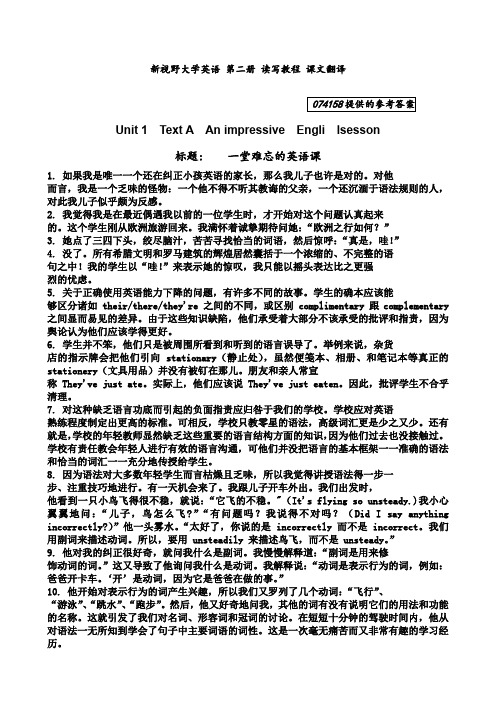
新视野大学英语第二册读写教程课文翻译Unit 1 Text A An impressive Engli lsesson标题: 一堂难忘的英语课1. 如果我是唯一一个还在纠正小孩英语的家长,那么我儿子也许是对的。
对他而言,我是一个乏味的怪物:一个他不得不听其教诲的父亲,一个还沉湎于语法规则的人,对此我儿子似乎颇为反感。
2. 我觉得我是在最近偶遇我以前的一位学生时,才开始对这个问题认真起来的。
这个学生刚从欧洲旅游回来。
我满怀着诚挚期待问她:“欧洲之行如何?”3. 她点了三四下头,绞尽脑汁,苦苦寻找恰当的词语,然后惊呼:“真是,哇!”4. 没了。
所有希腊文明和罗马建筑的辉煌居然囊括于一个浓缩的、不完整的语句之中!我的学生以“哇!”来表示她的惊叹,我只能以摇头表达比之更强烈的忧虑。
5. 关于正确使用英语能力下降的问题,有许多不同的故事。
学生的确本应该能够区分诸如 their/there/they're 之间的不同,或区别 complimentary 跟complementary 之间显而易见的差异。
由于这些知识缺陷,他们承受着大部分不该承受的批评和指责,因为舆论认为他们应该学得更好。
6. 学生并不笨,他们只是被周围所看到和听到的语言误导了。
举例来说,杂货店的指示牌会把他们引向 stationary(静止处),虽然便笺本、相册、和笔记本等真正的stationery(文具用品)并没有被钉在那儿。
朋友和亲人常宣称 They've just ate。
实际上,他们应该说 They've just eaten。
因此,批评学生不合乎清理。
7. 对这种缺乏语言功底而引起的负面指责应归咎于我们的学校。
学校应对英语熟练程度制定出更高的标准。
可相反,学校只教零星的语法,高级词汇更是少之又少。
还有就是,学校的年轻教师显然缺乏这些重要的语言结构方面的知识,因为他们过去也没接触过。
学校有责任教会年轻人进行有效的语言沟通,可他们并没把语言的基本框架一一准确的语法和恰当的词汇一一充分地传授给学生。
人教新版九年级英语Unit11sectionA3a课文翻译与讲解

P83A2a 课文参考译文一位快乐人的衬衫很久以前(a long time ago ),在一个富饶美丽的国家住着一个不快乐的国王,他睡不好觉而且也不想吃东西,他总是面色苍白如粉笔(be pale as chalk )。
他经常无缘无故地哭泣(cry for no reason )。
这使王后和他的臣民很担心。
一天,一名医生被召入宫给国王检查(examine)。
但是他发现国王身体没什么疾病。
“病根都在他的思想。
药和休息都不能帮助他。
他所需要的是一件快乐的人穿的一件衣服。
那将使他快乐起来。
”首相被召入宫,但是当他们把国王的情况解释(explain sth. to sb )给他时,他说:“虽然我有很大的权力(power ),但是它并没使我开心。
我总担心失去我的权力。
许多人想取代我的位置。
然后,国王的银行家来到宫殿。
他说:“恐怕我也不开心。
我有很多财富(wealth ),但我总担心失去我的钱。
每天有人想偷我的钱。
”后来,国王的歌唱家来到宫殿。
但是他是这样说的:“我很出名且每个人都喜欢我的歌,但我也不开心,因为我总担心被别人模仿,我不能自由。
”最后,国王的上将军被派出去在三天内(in three days ’time )找到一个快乐的人。
课文重难点讲解:1.含有un-前缀的单词:表示不.. unhappy ,unimportant.unlike ,unfair ,unreal ,unable ,unlucky ,unknown (不详). 2.long,long ago=once upon a time=a long time ago 从前,很久以前3.leave out 忽略,不提及He left out the possiblity that the train might be late. Feel left out 觉得被冷落了,觉得被遗忘了觉得被冷落了,觉得被遗忘了. When the baby feels left out ,he will try to cry to get his parents’attention. 4.feel like doing =would like to do =want to do 想要做x 事,但是也有点区别,见下表Feel like 接名词,代词,动词ing 形式(动名词)构成feel like doing sth 或者或者feel like +名词,代词名词,代词Would like 接名词,代词,动词不定式构成would like to do sth.或者would like+名词,代词.would 不受时态和人称的影响want 接名词,代词,动词不定式构成want to do sth.或者want+名词,代词e.g.I feel like going/would like to go / want to go for a walk after dinner. for a walk after dinner. Li Ping f eels feels like /would like/ wants some fish some fishfor lunch. for lunch. 5.call in ,叫来,召来be called in 被叫来,被召见. The king called the general in to the palace. Hua Tuo was called in to examine Guan Yu in the story. 6.neither …nor …既不…也不…, …和...都不连接主语时谓语动词单复数遵循就近原则。
英语新目标八下units1-10课文翻译
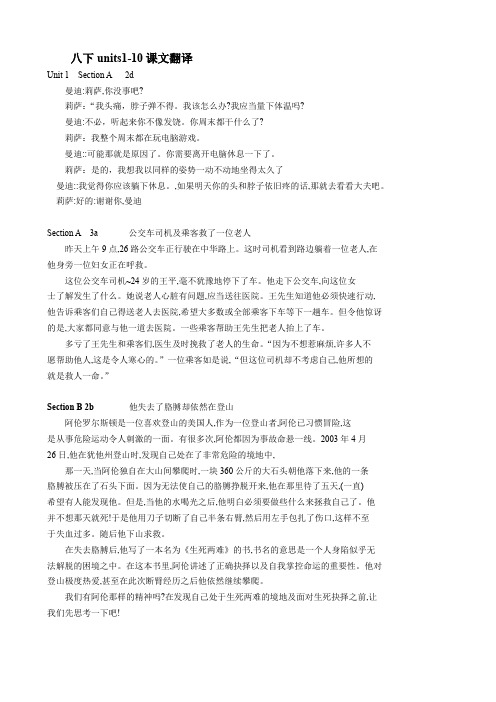
八下units1-10课文翻译Unit 1 Section A 2d曼迪:莉萨,你没事吧?莉萨:“我头痛,脖子弹不得。
我该怎么办?我应当量下体温吗?曼迪:不必,听起来你不像发饶。
你周末都干什么了?莉萨:我整个周末都在玩电脑游戏。
曼迪::可能那就是原因了。
你需要离开电脑休息一下了。
莉萨:是的,我想我以同样的姿势一动不动地坐得太久了曼迪::我觉得你应该躺下休息。
,如果明天你的头和脖子依旧疼的话,那就去看看大夫吧。
莉萨:好的:谢谢你,曼迪Section A 3a 公交车司机及乘客救了一位老人昨天上午9点,26路公交车正行驶在中华路上。
这时司机看到路边躺着一位老人,在他身旁一位妇女正在呼救。
这位公交车司机~24岁的王平,毫不犹豫地停下了车。
他走下公交车,向这位女士了解发生了什么。
她说老人心脏有问题,应当送往医院。
王先生知道他必须快速行动,他告诉乘客们自己得送老人去医院,希望大多数或全部乘客下车等下一趟车。
但令他惊讶的是,大家都同意与他一道去医院。
一些乘客帮助王先生把老人抬上了车。
多亏了王先生和乘客们,医生及时挽救了老人的生命。
“因为不想惹麻烦,许多人不愿帮助他人,这是令人寒心的。
”一位乘客如是说,“但这位司机却不考虑自己,他所想的就是救人一命。
”Section B 2b他失去了胳膊却依然在登山阿伦罗尔斯顿是一位喜欢登山的美国人,作为一位登山者,阿伦已习惯冒险,这是从事危险运动令人刺激的一面。
有很多次,阿伦都因为事故命悬一线。
2003年4月26日,他在犹他州登山时,发现自己处在了非常危险的境地中,那一天,当阿伦独自在大山间攀爬时,一块360公斤的大石头朝他落下来,他的一条胳膊被压在了石头下面。
因为无法使自己的胳膊挣脱开来,他在那里待了五天,(一直)希望有人能发现他。
但是,当他的水喝光之后,他明白必须要做些什么来拯救自己了。
他并不想那天就死!于是他用刀子切断了自己半条右臂,然后用左手包扎了伤口,这样不至于失血过多。
5B课文翻译
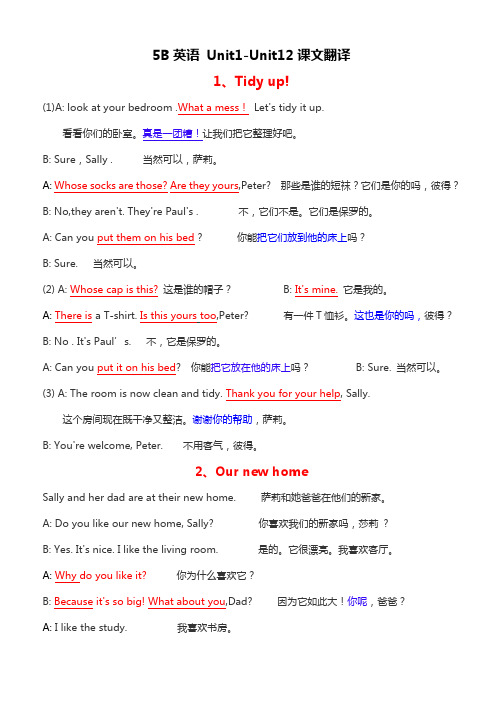
5B英语Unit1-Unit12课文翻译1、Tidy up!(1)A: look at your bedroom .What a mess!Let's tidy it up.看看你们的卧室。
真是一团糟!让我们把它整理好吧。
B: Sure,Sally . 当然可以,萨莉。
A: Whose socks are those? Are they yours,Peter? 那些是谁的短袜?它们是你的吗,彼得?B: No,they aren't. They're Paul's . 不,它们不是。
它们是保罗的。
A: Can you put them on his bed ? 你能把它们放到他的床上吗?B: Sure. 当然可以。
(2)A: Whose cap is this? 这是谁的帽子?B: It's mine. 它是我的。
A: There is a T-shirt. Is this yours too,Peter? 有一件T恤衫。
这也是你的吗,彼得?B: No . It's Paul’s. 不,它是保罗的。
A: Can you put it on his bed? 你能把它放在他的床上吗?B: Sure. 当然可以。
(3)A: The room is now clean and tidy. Thank you for your help, Sally.这个房间现在既干净又整洁。
谢谢你的帮助,萨莉。
B: You're welcome, Peter. 不用客气,彼得。
2、Our new homeSally and her dad are at their new home. 萨莉和她爸爸在他们的新家。
A: Do you like our new home, Sally? 你喜欢我们的新家吗,莎莉?B: Yes. It's nice. I like the living room. 是的。
Unit-11-On-Becoming-a-Better-Student课文翻译综合教程三
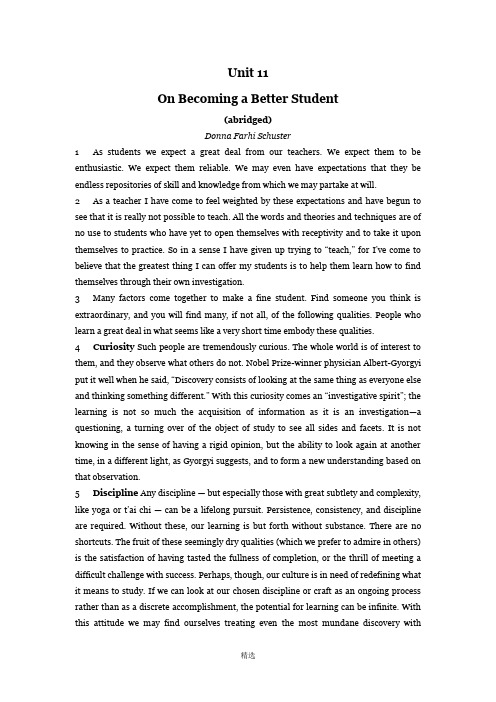
Unit 11On Becoming a Better Student(abridged)Donna Farhi Schuster1 As students we expect a great deal from our teachers. We expect them to be enthusiastic. We expect them reliable. We may even have expectations that they be endless repositories of skill and knowledge from which we may partake at will.2 As a teacher I have come to feel weighted by these expectations and have begun to see that it is really not possible to teach. All the words and theories and techniques are of no use to students who have yet to open themselves with receptivity and to take it upon themselves to practice. So in a sense I have given up trying to “teach,” for I’ve come to believe that the greatest thing I can offer my students is to help them learn how to find themselves through their own investigation.3 Many factors come together to make a fine student. Find someone you think is extraordinary, and you will find many, if not all, of the following qualities. People who learn a great deal in what seems like a very short time embody these qualities.4Curiosity Such people are tremendously curious. The whole world is of interest to them, and they observe what others do not. Nobel Prize-winner physician Albert-Gyorgyi put it well when he said, “Discovery consists of lo oking at the same thing as everyone else and thinking something different.” With this curiosity comes an “investigative spirit”; the learning is not so much the acquisition of information as it is an investigation—a questioning, a turning over of the object of study to see all sides and facets. It is not knowing in the sense of having a rigid opinion, but the ability to look again at another time, in a different light, as Gyorgyi suggests, and to form a new understanding based on that observation.5Discipline Any discipline — but especially those with great subtlety and complexity, like yoga or t’ai chi — can be a lifelong pursuit. Persistence, consistency, and discipline are required. Without these, our learning is but forth without substance. There are no shortcuts. The fruit of these seemingly dry qualities (which we prefer to admire in others) is the satisfaction of having tasted the fullness of completion, or the thrill of meeting a difficult challenge with success. Perhaps, though, our culture is in need of redefining what it means to study. If we can look at our chosen discipline or craft as an ongoing process rather than as a discrete accomplishment, the potential for learning can be infinite. With this attitude we may find ourselves treating even the most mundane discovery withwide-eyed wonder and joy.6Risk-Taking Why is it, then, that so few people live up to their true potential? Beyond the well-paved roads and secure structures we usually build for ourselves lie demons, unsure footing — and unfelt pleasures. To be a student is to take risks. Yet most education discourages people from venturing far enough to take risks to make mistakes. “Children enter school as question marks and leave as periods,” observes educator Neil Postman. What kind of punctuation mark do you represent? Do you find yourself looking for tidy answers that give you a feeling of security? By learning to find the one right answer, we may have relinquished our ability to find other answers and solutions. We learn, then, not to put ourselves into situations where we might fail, because failure has tremendous social stigma. When we try different approaches and do things that have no precedence in our experience, we will surely make mistakes. A creative person uses these “failure” as stepping stones.7Initiative Can we begin, then, to see that our teachers are guides on our journey, but that the journey itself is our own responsibility? There is nothing quite so satisfying as undergoing a difficult process and after long hard work discovering the true nature of that process. It could be as simple as throwing a perfect pot, or as complex as formulating a new theory of physics. The satisfaction we feel will be directly proportional to amount of work we do by ourselves to achieve our goal. Successful students do not expect to be spoon-fed, but take their own initiative. Wanting answers from my teacher has often been a way for me to avoid taking the initiative to discover my own answers through my own practice.8Enthusiasm To learn, then, is to open oneself. Jim Spira, director of the Institute for Educational Therapy in Berkeley, California, asks his students to prepare themselves to learn in this way: “Drop your prior knowledge … [and] attempt to grasp the new framework in it s own context. The student complains, ‘But I know what is important.’ If what you know is important, then it should be there when you finish the course. If you continually ‘hold onto it,’ then you’ll only see what is presented in terms of the old knowledge/framework and never really grow in new ways.”9 Finally, as we each advance on our own unique journey, let us live each day as beginners. Being “advanced” has its own pitfalls —among them complacency and pushing or forcing. To go deeper may mean to be still, to progress more patiently, or to devote more time to other areas of our lives as yet green and immature. As F.M. Alexander, of the Alexander technique, once said to his students as they strained and labored, “Give up trying too hard, but never give up.”10TIPS FOR THE ASPIRING STUDENTThe information that follows is designed as a guide. The author welcomes correspondence from those who can add to it.●Be attentive. Teachers will usually go out of their way to help a self-motivated andinterested student.●Be seen. If you want the teacher to know that you are serious, sit or stand in thefront of the class. Make eye contact and introduce yourself, either before or after class.●Be on time. Consistent lateness is a sign of disrespect. If you take your teacher’sskill so lightly, why should he or she take you seriously? Missing the beginning of class can also be physically dangerous if you have missed explanations and work meant to prepare you for more difficult movements.●Be consistent. The quality of any class improves when there is a collectivecommitment to regular attendance. In this way you can gain a cumulative knowledge and progress at a more rapid pace. On a more practical level, your attendance may be your teacher’s livelihood.●Listen with your whole body. We have come to treat words like the backgroundnoise of a radio. Plant words in the pertinent area of your body so that information can be “embodied”.●Appreciate constructive criticism. Remember why you’re there—to break throughrestrictive habit patterns and to change. Teachers usually reserve the most scathing criticism for their most promising students!●Questions can help clarify and enrich both teacher and student if the student’squestions are pertinent. If, on the contrary, the student is asking questions because he or she is late or inattentive, the student is being disrespectful to the teacher and fellow classmates and is consequently lowering the quality of the class. Highly personal questions with little relevance to the subject at hand are best asked after class.●You have the right to disagree — but you do not always have the right to express it.Sometimes it is appropriate to challenge a teacher. It is unethical, however, to argue with a teacher or badger a teacher in public. If you thoroughly object to what is being taught, you are free to leave and learn elsewhere.●Let your teacher know how much you appreciate him or her. Teachers needencouragement like everyone else. Giving them feedback when something has proved particularly beneficial or injurious to you can help them improve the qualityof their teaching.优秀学生是怎么炼成的(节选)唐娜·法伊·舒斯特1. 作为学生我们对老师期望甚高。
- 1、下载文档前请自行甄别文档内容的完整性,平台不提供额外的编辑、内容补充、找答案等附加服务。
- 2、"仅部分预览"的文档,不可在线预览部分如存在完整性等问题,可反馈申请退款(可完整预览的文档不适用该条件!)。
- 3、如文档侵犯您的权益,请联系客服反馈,我们会尽快为您处理(人工客服工作时间:9:00-18:30)。
Unit 11课文翻译a
2d 1.怎么了?What happened to...?\What’s wrong with ...?
2.开始了解get to know
3.有共同之处have...in common
3.成为...更好的朋友be better friends with...
4.为什么不...?Why don't you..?\Why not+动词原形
5.感觉被冷落feel left out
南希:嗨!伯特,我想我让爱丽丝生气了,而且我还不确信该怎么做。
波特:发生什么事了?
南希:你知道朱莉是爱丽斯最好的朋友,对吧?
波特:嗯嗯。
南希:唔,我对朱莉了解得越多,越感到我们有许多相同之处。
所以我们最近在一起度过的时间比较多。
波特:但那有什么问题吗?
南希:嗯….这让爱丽丝不开心,因为她认为朱莉现在成为了跟我比跟她更要好的朋友。
波特:我知道了。
嗯….每次你和朱莉在一起做事的时候,你为何不邀请爱丽丝加入呢?这样她就不会觉得被冷落。
南希:奥,好主意!那能使我们的友谊更加牢固。
Section A 3a 快乐者的衬衫!(1)
很久以前,在一个富饶而又美丽的国家里,住着一位不开心的国王。
他睡不好觉,也不愿吃东西。
他的脸苍白如粉笔,还常常无端哭泣。
这让往后和他的子民都很担心。
一天,一位医生被招来给国王检查身体。
但他发现国王的身体并没有任何的问题。
“他的病都在心里。
药物和休息对他都无效。
他需要的是一个快乐的人所穿的衬衫,那会使他快乐起来。
”
首相被叫到宫殿,但当人们把国王的情况向他解释后,他却说:“尽管我有很多权利,但他并没有让我快乐。
我总是担心会失去权力。
有许多人都在试图取代我的位置。
”
接着,国王的银行家来到宫殿,“唉,我恐怕也不快乐呢,”他说:“我有很多财富,但是我总是担心丢失钱财。
每天都有人想窃取我的金钱。
”
接下来,宫殿的歌手来到国王的房间,但是他所说的是:“的确我很有名,而且每个人都喜欢我的歌。
但是我并不快乐,因为我总是担心被别人跟踪,我没有自由。
”
最后,国王的大将军被派出去,要他在三天之内找到一个快乐的人。
1.他睡不好觉,也不愿吃东西。
He and didn’t
2.他的脸苍白如粉笔。
His face was always .
3.他常常无端哭泣。
He often cried .
4.他的身体并没有任何的问题。
his body.
5.他的病都在心里。
It’s all .
6.药物和休息对他都无效。
medicine rest can help him.
7.我总担心会失去权力。
I’m always my power.
8.我总担心丢失钱财。
I’m always my money.
9.我总担心被别人跟踪。
I’m always worried about others.。
